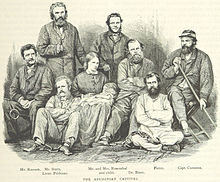Hormuzd Rassam
He is known for making a number of important archaeological discoveries from 1877 to 1882, including the clay tablets that contained the Epic of Gilgamesh, the world's oldest notable literature.
Hormuzd Rassam was an ethnic Assyrian, born in Mosul in Upper Mesopotamia (now modern northern Iraq), then part of the Ottoman Empire.
At the age of 20 in 1846, Rassam was hired by British archaeologist Austen Henry Layard as a paymaster at Nimrud, a nearby ancient Assyrian excavation site.
These included the clay tablets that would later be deciphered by George Smith as the Epic of Gilgamesh, the world's oldest written narrative poem.
England decided to send Rassam as an ambassador with a message from Queen Victoria in the hope of resolving the situation peacefully.
Due to rebellions in Tigray Province, Rassam was forced to follow a circuitous route taking him to Kassala, then to Metemma along the western shore of Lake Tana before finally meeting with Emperor Tewodros in northern Gojjam.
At first his effort seemed promising, as the Emperor established him at Qorata, a village on the south-eastern shores of Lake Tana, and sent him numerous gifts.
However, about this time Charles Tilstone Beke arrived at Massawa and forwarded letters from the hostages' families to Tewodros asking for their release.
[5] Rassam, writing in his memoirs of the incident, is more direct: "I date the change in the King's conduct towards me, and the misfortunes which eventually befell the members of the Mission and the old captives, from this day.
In 1869, the London Quarterly Review received Rassam's memoir of the Abyssinian crisis positively, acknowledged Rassam's qualifications for the mission and defended his actions under difficult circumstances: [I]t will remove any doubts that may still exist as to the origin of his mission, the wisdom of the selection of its chief, and the manner in which a task of extraordinary difficulty, delicacy, and danger was performed...it [is] shown by Mr. Rassam that two successive Governments should have expressed their entire approval of his conduct Lord Stanley has done, that he is above party of a public officer who has been unjustly attacked and condemned; and in a letter to Mr. Rassam, laid before Parliament, he expressed the high sense entertained by Her Majesty's Government of his conduct during the difficult and arduous period of his employment under the Foreign Office, and declared that he had acted throughout for the best, and that his prudence, discretion, and good management seem to have tended greatly to preserve the peace.
[11] In Assyria his chief finds were the Ashurnasirpal temple in Nimrud (Calah), the cylinder of Ashurbanipal at Nineveh, and two of the unique and historically important bronze strips from the Balawat Gates.
Sir Henry Rawlinson, the "Father of Assyriology", was a linguist who was a key figure in the deciphering of cuneiform, also one of the trustees of the British Museum at the time of Rassam's later excavations.
[14] Later archaeological evidence found in relation to artefacts such as the Balawat Gates at Dur-Sharrukin support Rassam's account of the dispute.
His eldest daughter, Theresa Rassam, born in 1871, became a professional singer who performed with the D'Oyly Carte Opera Company.
A number of personal effects relating to his career, including the chains he had worn in captivity in Ethiopia, were donated to Hove Museum, and were on display there until the 1950s, according to the recollections of his great-grandson, Cornelius Cavendish.

